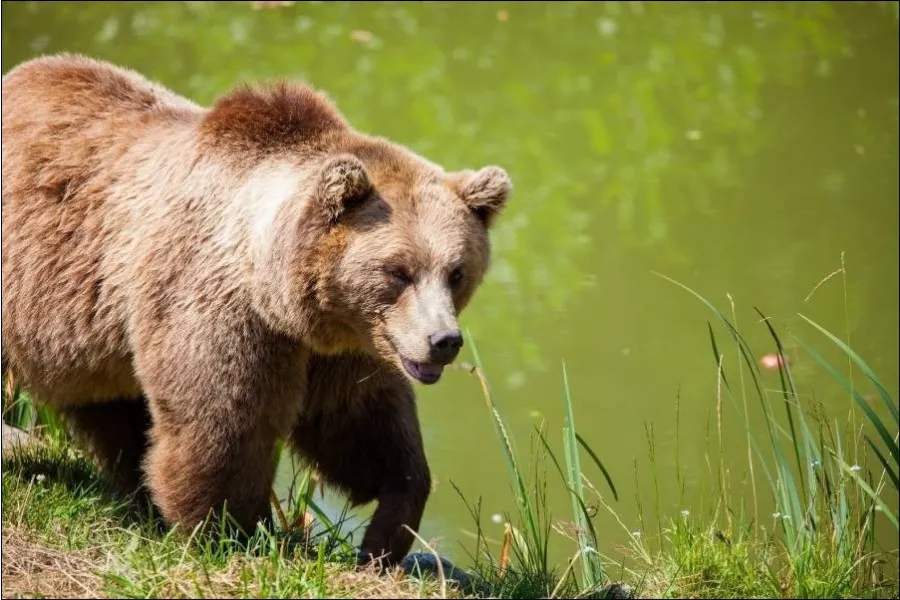
If you live in North America, you might have seen a bear roaming around in your neighborhood. It’s not too common, and when bears show up, there is usually a news report about it. So why do bears come to visit us? I did some research and wanted to share the findings.
Bears usually come into towns in April, May, and June after hibernation, when there’s a scarce food supply. Sometimes females bring their young cubs into town to seek refuge from male bears who want to kill the cubs to make the female stop lactating and enter reproduction mode again.
One might think the bear is visiting to tell us about forest fires and how we can prevent them – but the simple answer is they are hungry. The most common time bears visit towns is after hibernation, and the bears have slept for several months and are hungry. In July, when the salmon population is at its peak, the bear visits decrease.
Male bears want to preserve their DNA and will go up and beyond to do so. They will kill bear cubs in order to stop females to stop lactating and be re-enter reproduction mode. Therefore, female bears will sometimes seek refuge in towns.
What attracts bears to your yard?
Bear’s main goal for visiting your yard is to find something to eat. Dogs can smell 300 times better than humans. However, a bear is able to smell 100 times better than a dog. Bears can pick up smells, not even dogs can. Therefore, the most common reason bears are attracted to your yard is because you have something that smells good.
Bears eat almost anything that humans eat, so it’s essential to remove any sources of smell. Although, it doesn’t have to be edibles.
Scented items that smell good that may attract bears are:
- Aftershave
- Body wash
- Candles
- Fabric softener
- Glue
- Hair wax
- Incense sticks
- Insect repellent
- Laundry detergent
- Lip balm
- Makeup
- Potpourri
- Sharpies
- Soap
- Suntan lotion
- Washing powder
🐻 Can all bears swim? Check our other article here.

How do you prevent bears from coming to your yard?
1. Make noises
Bears aren’t fans of loud noises, especially when they get startled and it surprises them. You can make noise actively by using a bear horn. However, if you would make passive noises that the bear doesn’t like you can install wind chimes and bells. My grandparents had a small decorative windmill in their garden that made a sound almost like a bicycle tire. It prevented deer from getting to their rose bushes.
2. Electric bear fence
If you have problems with bears entering your yard, an electric bear fence might do the trick. If there’s a specific part of your yard you want to protect, you can surround it with a fence. Beekeepers, for example, like to surround their beehives. If you are like me and like to go camping, there are mobile fences you can bring that you can set up around your camping site and protect yourself from bears. Here are some good listings on Amazon.
3. Protect your trash
The smell of trash is one of the biggest reasons bears are coming to your yard. Imagine how many different smells you go through a week. There are multiple ways you can protect your trash. The most basic thing is to add an easy locking mechanism to your trash can. You can have bungee cords, straps, latches, and regular baby locks. Check popular locks here. There is also the more fancy option, to put your trash cans inside a small shed. There are some great outdoor shed listings here.
4. Turn your compost regularly
If you have compost, it will start smelling more if you don’t turn it over from time to time. You will invite air into the compost and help it breathe, and release some of the pressure built underneath. I aim to turn my compost every three days. You shouldn’t add meat or other things from animals in your compost. Try also to avoid adding sweet foods in there that may attract bears.
5. Use chili pepper spray around your crops
If you have crops you don’t want the bears to want to eat, you can protect them by spraying some chili pepper spray around them. The bear’s sensitive nose will notice the pepper and avoid the plant. If you have cats or dogs, you might want to think twice about this. Pepper spray listings here.
6. Keeping grills clean and covered
Grease smells both good and far. Make it a habit to always clean your tongs and cover your barbeque when you are not using it. Clean the griddle, tongs, grates after every use, and cover the grill with a cover.
7. Don’t let beehives and birdhouses be too accessible
As you may know, bears like honey. If you are a beekeeper, you might want to restrict access to the beehives with a fence. If you have bird feeders that can be accessible from the ground, you should consider putting the feeder even higher. Bears will try to access the delicious seeds and birds. Avoid hanging the bird feeder from a tree. It’s better to hang it from the less windy side of your house.
What do you do if there is a bear in your yard?
If you are indoors and don’t mind, there’s a bear in your yard for the time being; you don’t have to do anything. However, it would be best if you took care of what attracted the bear to your yard afterward. If you encounter a bear in your yard, you will need to identify the bear species before acting.
Black bears are most likely to be more scared of you than you are of them. Attacks from black bears are rare, and usually, you can scare them away by making yourself big and be loud. Never turn your back on a black bear and always face it directly, and do not approach them either. Read more about why bears attack humans here.
Brown and grizzly bears are braver than black bears. If you encounter a brown/grizzly bear in your yard and you have no option to easily escape indoors, you need to play dead and cover your neck and head. Spread your legs, so it’s harder for the bear to turn you over. Remain still until the bear leaves the area.
Can Bears Run? Check our comparison. 🐻
